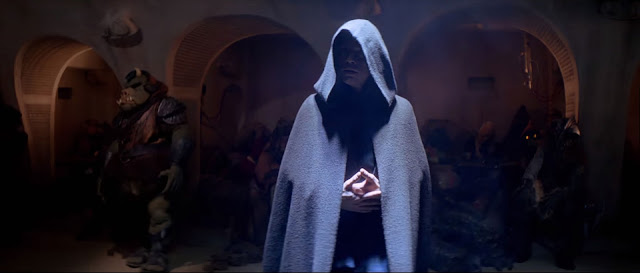The Mechanic
A character starts with two Titles: background and origin. One of these is probably race or species if that is relevant to your game. Each title has a name (class, race, specialty, background), one or more bonuses (probably a class ability, some hit points, and a save improvement), and a deed.To "level up" meaning gain a new Title, the character has to accomplish a deed matching to each of their Titles, checking them off one-by-one, at which point they write down a new Title and Deed and remove the check from all. Each deed has to be distinct and any particular situation can only apply to one Deed of the player's choice, with the DM having veto power.
DMs might cap the number of titles to control the "maximum level" of a campaign. They instead overwrite the old trait of their choice. The PC is replacing knowledge and tricks as the old bits fall away.
Update (7/15/2019): Lexi of A Blasted, Cratered Land has taken this and adapted it for her own rules hack Mimics and Miscreants. It hews closer to traditional class systems than shown here.
 |
| From apprentice... |
A Fictional Example
Obviously, I designed the deeds around what Luke actually did in the movie, but this can still help you understand the idea in practice.
Luke Skywalker has "Peasant (Tatooine moisture farmer): Travel beyond your frontiers," and "Hotshot Pilot: Engage in a dogfight," written on his character sheet, each with some bonuses and ability. Upon meeting Obi-Wan and becoming a PC, he writes down on his sheet "Jedi Apprentice: Use the Force to do something impossible," which he manages to accomplish very soon when he impossibly blocks the remote's zap with a lightsaber blind. Going off planet is far beyond his frontier and the tie fighter attack is a dogfight. So by Yavin IV he has leveled up and gained whatever bonuses that he worked as appropriate for Jedi Apprentices. Ding.
After Apprentice, he wrote down "Big Damn Hero: Do whatever it takes to save others." Which he accomplished on the Deathstar run, after achieving dogfight in the battle above the Deathstar and frontier upon arriving on a jungle planet. But since he applied "destroying the deathstar" to save others, the use of the Force to aim the proton torpedo can't be used for it too. However, he quickly snags it when he impossibly draws his lightsaber out of the snow to free himself and defeat the Wampa. Ding. He writes: "Jedi Knight: Fight a peer using your lightsaber."
Snowspeeder Battle suffices for a dogfight and heading to Yoda on Dagobah (or solo hyperspace travel) for a new frontier. He's already lifted things with his mind but manages to convince his DM that the (impossible) escalating series of Force feats he does under Yoda's tutelage qualify for Apprentice because they are different enough from the lightsaber pull earlier. He runs to his friends despite being entirely unprepared in hopes of saving them. Finally, he (lightsaber) duels with his father. Ding. He writes "Jedi Master" and it's deed on his sheet.
He heads to Jabba's palace to save his friends. Boba Fett is a peer and he uses his lightsaber. Speeder bikes are close enough to dogfight. Death Star was never marked for frontier before, which is nice because it gets marked now. Endless impossible force uses are demonstrated, but invading the mind of Jabba's majordomo qualifies. Finally, in the duel with his father, he achieves "Jedi Master: win without fighting." Ding.
By the end Luke is (and has a marked on his sheet): Peasant, Hotshot Pilot, Jedi Apprentice, Big Damn Hero, Jedi Knight, and Jedi Master.
 |
| ...to master. |
Commentary
For your game of choice, it's probably best to sprinkle a few samples into your game to demonstrate the themes, aesthetics, and direction you want for your game, and then work with your players to define the rest as you go. Titles can be drawn from the various early game level titles, from the least egregiously dumb 3rd edition classes, or from this awesome generator. Write out a couple for each PC race, a few for whatever the PC might have been up to or whatever starting skills they might have, then a few more to define the setting (Defiler, Gladiator, Templar, and Psion, for example), all with a deed and an ability so that players can quickly pick two and play. Don't force them to create it all from scratch before game 1.In LotFP, Fighters gain about +6 total to their saves (across all categories) in their first 10 levels or a bit over half per level per category. A +3 save improvement for each Title distributed as desired will be roughly comparable. Most human characters are similar. Demi-humans advance faster. Hitpoints obviously vary more by class. For OD&D-based games, it's a simple +3 to saves and +3 or 4 hit points.
Class abilities are what will really get your players excited. You can cut and paste class features around, hand out spell dice, add attack bonus and a hit point or two (if you just wanted to play Fighter anyways), basically anything from GLOG, abilities from the many random class advancements, really whatever you want. Titles aren't classes, you aren't defined into them, and you have to act like a Title before you can claim its abilities, so write down what makes sense for your PC.
It's probably a good idea to write down whatever you did to accomplish each deed on the back of your sheet both to ensure that you aren't just doing the same thing over and over and because it will be fun to one day look back and read a tale of your adventures, written one deed at a time.
No comments:
Post a Comment